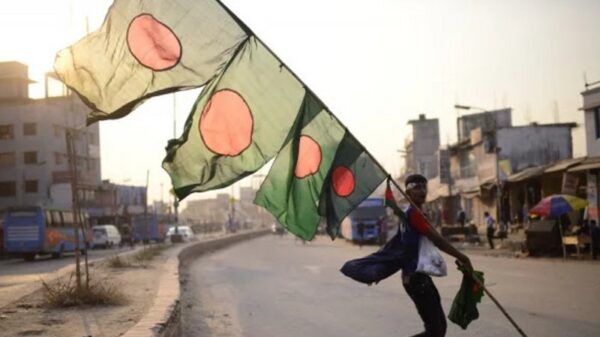Bangladesh’s remarkable economic progress can and must continue. That was the message from a major conference in Brussels on the potential for trade and investment among Bangladesh and the EU countries, writes Political Editor Nick Powell.
Bangladesh’s economic growth in recent years has been truly remarkable and made it the economic powerhouse of the South and South East Asia region. Its economy was worth $70 billion when the Prime Minister, Sheikh Hasina returned to power in 2009, under her leadership it has grown to $465 billion.

Addressing an audience primarily drawn from the business communities of Bangladesh and the European Union, the country’s Ambassador to the EU, Mahbub Hassan Saleh, said its achievements made the government and people proud but not complacent, with a great sense of potential for the future.
He said Bangladesh aspires to be an upper-income country within a decade and to be considered one of the world’s developed nations by 2041. He pointed to the latest in a series of remarkable projects that are transforming the transport infrastructure and opening up new trade routes both within and beyond his country’s borders.
The Bangabandhu Sheikh Mujibur Rahman Tunnel was opened at the end of October. It passes under the mouth of the Karnaphuli River in the port of Chittagong, with a total length of over nine kilometres. It is the first underwater tunnel in South Asia and an important part of the Bangladesh-China-India-Myanmar Economic Corridor.

Peteris Ustubs, the Director for Asia in the European Commission’s Directorate-General for International Partnerships, said the Commission, together with the European Investment Bank and the Asian Development Bank, to finance the upgrading of the railway linking Chittagong Port to the wider region. He said Sheikh Hasina’s visit to Brussels a week earlier had sent what he called “strong signals” to the European Union and brought about a fresh focus on achieving a new EU-Bangladesh agreement.
Bangladesh, he said, is on a strong path to success, not only graduating from the status of a least developed country but moving well beyond. Ambassador Mahbub Hassan Saleh said his Prime Minister had campaigned on behalf of all countries graduating from the least developed status, not just Bangladesh, for an extension to the existing terms of trade until 2032. Continuing the present tariff and quota-free access to the European market for six years would allow for a smooth transition to a new trade and investment partnership.

The present arrangement is known as ‘Everything But Arms’, as weapons are the only exception. The Ambassador pointed out that in a similar fashion, Bangladesh is open to foreign investment in all sectors except for the defence industry. He said it had been a unique honour to organise Sheikh Hasina’s visit to Brussels and her bilateral meeting with Commission President Ursula von der Leyen had gone exceedingly well.
The Prime Minister and President have launched a new partnership agreement to take the relationship to the next level. The Ambassador said Bangladesh has decided to partner with its trusted and tested friends in the EU on its developmental journey. Its basis was their common values of democracy, secularism and people’s freedom.
Professor Shibli Rubayat-Ul-Islam, the Chair of the Bangladesh Securities and Exchange Commission, said Europe is always a good friend of Bangladesh. He stressed that he and his colleagues were not in Brussels to look for aid and loans but for trade and investment and of course for business partners. He said garment exports remain the most crucial part of the country’s economy, accounting for more than 80% of its foreign exchange.

In the last ten years, European imports of garments from Bangladesh have grown at an average annual rate of more than 9%, he continued, making his country the EU’s leading supplier by quantity of clothing. But the professor also pointed to what Bangladesh offered Europe’s exporters, the regional importance of its transformed transport infrastructure meant it offered access to half the population of the world.
In a video message to the conference, Prime Minister Sheikh Hasina spoke of the huge transformation of the past 15 years. Annual growth of 6-7% had been maintained despite the economic shocks of the Covid pandemic and the war in Ukraine.
The former United Nations Secretary-General, Ban Ki-moon, once described Bangladesh as a role model for developing countries. Its economy is expected to exceed $0.5 trillion by next year and if it stays on its present course, it’s on its way to $1 trillion.










































